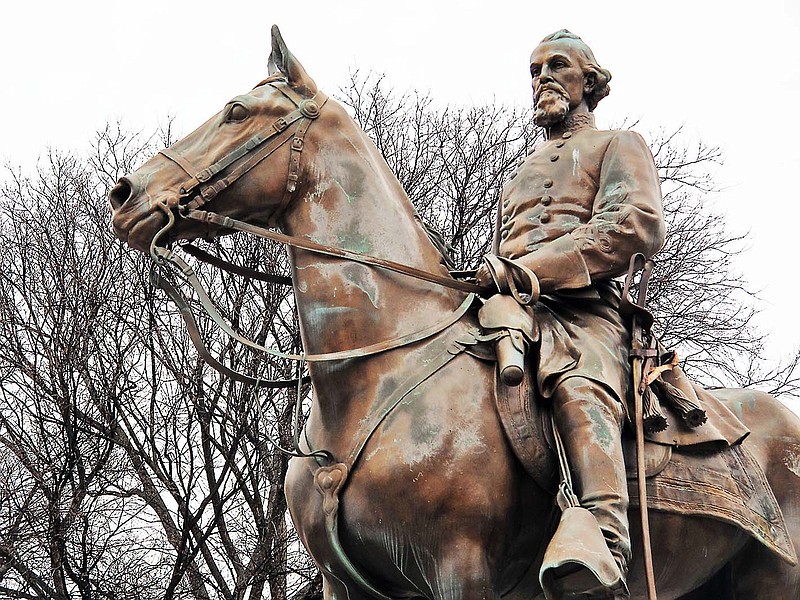Tennessee Gov. Bill Haslam is in the pondering stage on two bills we wish weren't before him.
One would suggest to members of the State Capitol Commission that they erect a monument to unborn children - victims of abortion - on the grounds of the state capitol.
The other would prevent cities from selling or transferring property with historic statues and memorials without the permission of the Tennessee Historical Society or the courts.
The first bill does not come with a mandate, so Haslam's signature only means the suggestion comes with the imprimatur of the governor. It would be up to future State Capitol Commissions to secure funding in the budget for such a memorial and build it.
Legislators may or may not know it, but Chattanooga already is home to the National Memorial to the Unborn, which is located on the site of a former abortion clinic in East Brainerd and features a 50-foot granite wall of names from individuals and families all over the country, a remembrance garden and a pool dedicated to the memory of children lost to miscarriage.
The website for the memorial also lists 16 other sites across the country - no others in Tennessee - in which the unborn are remembered.
While we're entirely sympathetic to the ongoing tragedy of abortion, we would prefer legislators instead of building another marble memorial continue to seek laws that would discourage abortion, legally limit the number of them that could be performed, and encourage abstinence, birth control and adoption.
Fortunately, the number of abortions in Tennessee has fallen every year since 2008 and has fallen in 18 years since 1991. Indeed, the number of abortions in the state in 2016, the last year for which records are available, is 47 percent less than it was in 1990.
We don't believe another memorial to the unborn will decrease abortions any faster than they already are decreasing, and we don't feel the lack of a memorial will cause them to rise.
The bill, nevertheless, passed the state House 63-15 and the state Senate 23-3.
We wonder how many legislators really voted their conscience on this bill, knowing that opposing it might get them labeled as favoring "killing babies." The bill reminds us of the 2016 measure to adopt the Bible as the state's official book. Many may have thought, as we did, that such passage trivialized the book but didn't feel they could be on record as being "against" the Bible.
We hope Haslam will veto the bill, especially since whatever the state already is doing is working.
The second bill has a little bit of a revenge motive to it, but it also makes sense.
Legislators thought they had crossed their t's and dotted their i's on the reactionary and unwise removal of statues in places for 100 or more years when they amended the Tennessee Heritage Protection Act in 2016. But the city of Memphis did an end-run on legislators late last year by transferring land known as Health Sciences Park - with statues of Confederate President Jefferson Davis and Confederate Gen. Nathan Bedford Forrest on them - to a newly created nonprofit corporation, Memphis Greenspace, which then legally had the statues removed.
The Heritage Act already had within it a mechanism that allows "a public entity exercising control of a memorial" to petition the Tennessee Historical Commission in writing for a waiver from the prohibition to remove it from public property. But Memphis chose to go around the mechanism.
The infuriated legislators stripped out a proposed $250,000 expenditure from the 2019 budget that would have helped fund planning for Memphis' bicentennial celebration next year, but the bill before Haslam now has nothing to do with that.
It doesn't prevent the removal of statues and memorials, either, but says cities must have the permission of the historical commission to do so. The disposition of historical artifacts in the state was why the commission was created, after all. It seems reasonable to us that such a body be able to weigh in and give the longer, broader view on memorials that have been in place for many years rather than being at the mercy of knee-jerk, politically correct judgments.
The bill also brings in the courts, meaning a judicial decision on a statue or memorial would override a city's sudden move.
We wish it weren't necessary but believe it is a reasonable amendment to the Heritage Protection Act, ensuring there is at least historical or judicial consultation before action is taken. It won passage in the House 79-1 and the Senate 26-4.
Haslam, of course, can sign the measure, veto it or let it become law without his signature. We hope he'll sign this one.
